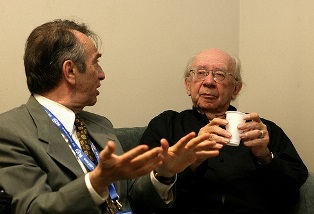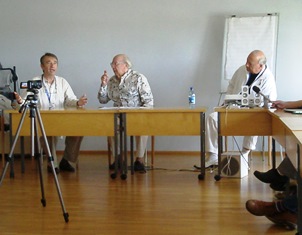
Gennady Rozhdestvensky Shares Thoughts with Students in Pärnu
A distinguished visitor dropped in on the Pärnu
Music Festival Järvi Academy in Pärnu Estonia in July, Russian conductor Gennady
Rozhdestvensky. A rehearsal of the Pärnu Festival Orchestra led by Paavo Järvi
stopped as he entered the Concert Hall in Pärnu, just off a plane from Stockholm
to Tallinn and a two-hour drive to Pärnu. Everyone stood and applauded as Järvi
introduced him.

During his visit, Rozhdestvensky sat in on master classes led by Neeme Järvi, Paavo Järvi and Leonid Grin and attended festival concerts with his wife, pianist Viktoria Postnikova (he did not conduct).
Best of all, he shared memories and answered questions by students of the Järvi Academy, an annual workshop for young conductors held in Pärnu since 2001. The meeting was held at the Tervis Spa in Pärnu. Grin, a lifelong friend, translated his comments from Russian into English. It was a warm and highly informative occasion, light-hearted and spiced with humor. Joining them for some delightful observations of his own was Neeme Järvi, another friend of Rozhdestvensky from the days they lived and worked in the Soviet Union.
It was a generous hour-and-a-half that no one wanted to end. Questions were posed by both Grin and the Academy students.
It began with a bit of biography. Rozhdestvensky, 82, studied with his father, conductor Nikolai Anosov, at the Moscow Conservatory. (He took the name of his mother, soprano Natalya Rozhdestvenskaya, to avoid any appearance of nepotism.) He began his career as a conductor leading the orchestra of the Bolshoi Theatre in 1951 at the age of 20.
The first question directed to him was what is the most important piece of advice you would give a young conductor?
“Number one, you must have something to prove,” he said, also a “fanatic devotion to your profession of music” and a “willingness to sacrifice.”
“Take it as it comes,” he said, recalling his days as an assistant conductor in Mannheim. The great German conductor Oskar Fried began as a dog trainer in a circus, then filled in for the orchestra conductor one day. Rozhdestvensky shared this quote: “That soldier is not good who is not dreaming of becoming a general.”
Playing an instrument is important, he said. Pianists have the advantage of accompanying singers, while it is helpful to be a string player because “members of the orchestra understand your way of thinking.”
Question: Is it important to focus on a particular repertoire or is it better to be a generalist?
To this Rozhdestvensky said, “It is important to have wide exposure, but follow what is close to your heart. Each of us has a tight connection to something.”
Neeme Järvi lent an observation here (reflective of
his wide exposure to the orchestral repertoire and his near 500 recordings):
“You need to learn everything. Be a fanatic.”

Question: What about authentic performance practice?
“It is important,” said Rozhdestvensky, “but don’t abuse the connection.” Those who adhere to authentic performance practice are often “not conductors but musicologists.”
Rozhdestvensky inserted here his recollection of an interview with a Budapest newspaper, in which he was quizzed about his ability to conduct from memory. His answer was, “It is easy after having memorized the Moscow telephone book.” After the interview came out, “all the Budapest telephone books were bought up by young conductors,” he said.
Question: Is it really important to memorize the score?
Answer: “Would you rather look at the score or the faces of the orchestra musicians?” Grin added this maxim: “It is better to have the score in your head than your head in the score.”
Question: What is most important in studying a score?
“Structural analysis,” said Rozhdestvensky, “how a phrase is organized.” Also, “distinguish tempo from musical pulse.” As an example, he cited the Overture to Mozart’s “Don Giovanni,” which is marked “alla breve” (two beats to the bar) but actually pulses in eight.
As a side issue, Rozhdestvensky noted that the first versions of Anton Bruckner’s symphonies are “always the best” (he has recorded all 21 versions of Bruckner’s nine symphonies).
A particularly engrossing part of his presentation related to his interaction with Dmitri Shostakovich and Sergei Prokofiev. Regarding Prokofiev, “I never actually met him,” he said. “I only saw him.” (Prokofiev died in 1953 when Rozhdestvensky was 22). As for Shostakovich, he said he “treasured” his collaborations with the composer.
Shostakovich’s dominant emotion was usually “discomfort,” said Rozhdestvensky, “because he was taking time away from composition.” Still, he could relax, confirmed Järvi, who also worked closely with him.
“He could tell good anecdotes,” said Järvi. Gogol was Shostakovich’s favorite writer, so he would often emulate him in his storytelling. Järvi recalled his tale about the funeral of a man who was found to be alive during his funeral ceremony. “Some of his relatives were happy. Others were not.” The orchestra playing Chopin’s Funeral March were concerned about “whether they would be paid or not.”
Rozhdestvensky was in excellent humor throughout the session, which drew many people in addition to the students. As it came to an end, he summed up what it takes to be a great conductor: “You must have inner presence or a long name.”